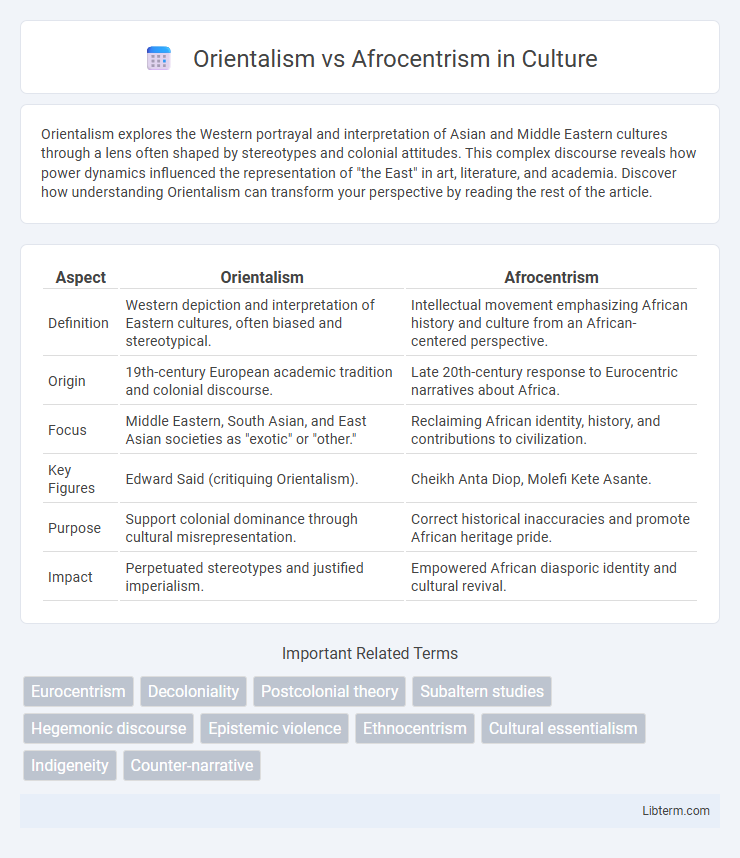Orientalism explores the Western portrayal and interpretation of Asian and Middle Eastern cultures through a lens often shaped by stereotypes and colonial attitudes. This complex discourse reveals how power dynamics influenced the representation of "the East" in art, literature, and academia. Discover how understanding Orientalism can transform your perspective by reading the rest of the article.
Table of Comparison
| Aspect | Orientalism | Afrocentrism |
|---|---|---|
| Definition | Western depiction and interpretation of Eastern cultures, often biased and stereotypical. | Intellectual movement emphasizing African history and culture from an African-centered perspective. |
| Origin | 19th-century European academic tradition and colonial discourse. | Late 20th-century response to Eurocentric narratives about Africa. |
| Focus | Middle Eastern, South Asian, and East Asian societies as "exotic" or "other." | Reclaiming African identity, history, and contributions to civilization. |
| Key Figures | Edward Said (critiquing Orientalism). | Cheikh Anta Diop, Molefi Kete Asante. |
| Purpose | Support colonial dominance through cultural misrepresentation. | Correct historical inaccuracies and promote African heritage pride. |
| Impact | Perpetuated stereotypes and justified imperialism. | Empowered African diasporic identity and cultural revival. |
Defining Orientalism: Origins and Concepts
Orientalism, a critical concept introduced by Edward Said, refers to the Western scholarly and artistic portrayal of Eastern societies as exotic, backward, and inherently different from the West. Rooted in colonialism and 18th- and 19th-century European imperialism, Orientalism constructs knowledge that justifies Western dominance by essentializing non-Western cultures. This framework contrasts with Afrocentrism, which centers African perspectives and challenges Eurocentric narratives by emphasizing African agency, history, and cultural contributions.
Understanding Afrocentrism: Key Principles
Afrocentrism centers African history, culture, and contributions as fundamental to understanding global civilization, countering Eurocentric narratives prevalent in Orientalism. It emphasizes the reclamation of African identity, valuing indigenous knowledge systems, languages, and traditions to challenge historical misrepresentations. Key principles include affirming African agency, promoting cultural pride, and prioritizing African perspectives in academic and social discourse.
Historical Contexts: Colonialism and Identity Formation
Orientalism emerged during European colonial expansion, framing Eastern societies as exotic and inferior to justify imperial dominance, deeply influencing Western perceptions of identity and culture. Afrocentrism arose as a response to colonial and Eurocentric narratives that marginalized African histories, emphasizing Africa's central role in global civilization to reclaim cultural identity and pride. Both frameworks highlight the impact of colonialism on identity formation, contrasting imposed colonial narratives with efforts to reconstruct authentic historical and cultural self-understanding.
Key Figures in Orientalism and Afrocentrism
Edward Said stands as a seminal figure in Orientalism, critiquing Western depictions of Eastern societies as exotic and inferior. In Afrocentrism, scholars like Cheikh Anta Diop and Molefi Kete Asante emphasize the importance of African contributions to global history and challenge Eurocentric narratives. These key figures shape the discourse by highlighting issues of cultural representation, power dynamics, and historical accuracy.
Eurocentrism’s Influence on Global Narratives
Eurocentrism heavily influences global narratives by framing history and culture through a Western lens, often marginalizing Orientalism and Afrocentrism perspectives. Orientalism exoticizes and stereotypes Eastern societies, while Afrocentrism seeks to reclaim African contributions and challenge Eurocentric historical biases. This dominance shapes academic discourse, media representation, and cultural identity, reinforcing unequal power dynamics worldwide.
Cultural Representation and Misrepresentation
Orientalism constructs the East as exotic, backward, and uncivilized through Western cultural representation, often perpetuating stereotypes and reinforcing colonial power dynamics. Afrocentrism challenges these misrepresentations by centering African perspectives, promoting authentic cultural narratives and reclaiming historical and cultural identity. Both frameworks critically examine how dominant discourses shape global understandings of culture, identity, and history.
Education and Curriculum: Shaping Worldviews
Orientalism in education often frames non-Western cultures through a Eurocentric lens, perpetuating stereotypes and limiting students' understanding of diverse histories and contributions. Afrocentrism challenges this by centering African perspectives and knowledge systems in curricula, fostering a more inclusive and accurate representation of history and culture. Integrating Afrocentric approaches reshapes worldviews by empowering students to critically engage with global narratives beyond Western biases.
Orientalism vs Afrocentrism in Art and Literature
Orientalism in art and literature often portrays Eastern cultures through a Western lens, emphasizing exoticism and stereotypes that reinforce colonial power dynamics. Afrocentrism challenges these narratives by centering African perspectives, traditions, and histories, seeking to reclaim and celebrate Black identity and creativity. These contrasting approaches shape artistic and literary representations, influencing how audiences understand cultural heritage and historical context.
Political Implications and Social Movements
Orientalism shapes Western political narratives by reinforcing stereotypes that justify interventionist policies and perpetuate social hierarchies, while Afrocentrism challenges Eurocentric historical perspectives, empowering African-descended communities through reclaiming cultural identity and fostering political solidarity. Both paradigms influence social movements; Orientalism often underpins anti-immigration rhetoric, whereas Afrocentrism energizes activism related to racial justice, decolonization, and reparations. The clash between these discourses affects global geopolitics by contesting dominant power structures and shaping collective memory in postcolonial societies.
Toward a Balanced Perspective: Future Directions
Future directions in the dialogue between Orientalism and Afrocentrism emphasize fostering a balanced perspective that critically examines historical narratives and cultural representations. Scholars advocate integrating multiple viewpoints to deconstruct stereotypes and address Eurocentric biases in both Orientalist and Afrocentrist discourses. Emphasizing interdisciplinary research and cross-cultural collaboration can promote nuanced understandings, enabling more equitable global dialogues on identity and heritage.
Orientalism Infographic

 libterm.com
libterm.com